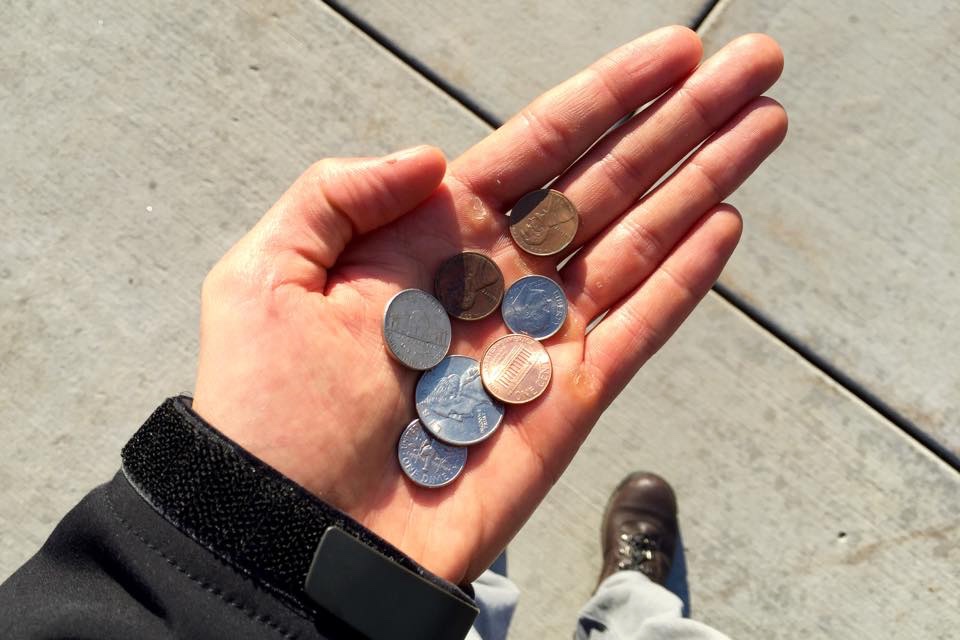|
The strike of the chord brought silence to the room. Heads turned to find the source of the music–a man seated at a piano. The eye examiner stopped her work and joined a mass of people around the piano, many of whom had pulled out their phones to immortalize the moment on social media. This was the scene in the eye examination room at Project Homeless Connect, the annual coming together of Milwaukee’s social services to help impoverished residents in one place. The man spontaneously playing the piano was a guest using the services. Maggie Petri, a sophomore nursing student at Marquette and volunteer that day, unlike the others the others in the room, did not get caught up in the fervor. Instead, she was skeptical. Not of the man, but of the crowd. “It just became this huge spectacle,” she said. “I have a hard time when people don’t treat people who are homeless like they aren’t normal.” Petri wondered why people responded with such fascination. The rush to take photos and videos made her uncomfortable. The audience appeared shocked that a person experiencing homelessness could play the piano. “Why would I take the time to stop and record the person if he wasn’t homeless?”
The trap of reacting differently based on someone’s appearance is all too easy. I know because I made the same mistake. During my internship at CNN, I wrote a story about Donald Gould, a man experiencing homelessness who went viral after a video surfaced of him playing a street piano in Sarasota, Florida.
Gould’s skills with the piano are unquestionable, but it is unlikely that the videos of him would have received the millions of views if he was not homeless. Instead, the video would be one of the millions of others on YouTube. Fascination with someone perceived as “different” pushes that person farther from social acceptance. We are shocked when a man who is homeless can play the piano, when we should be shocked at our unwillingness to accept the marginalized as people. What did you think? How can we change the way we interact with our neighbors? Leave a comment below or connect with me on Twitter.
1 Comment
He sits outside the 7-Eleven, tattered jeans and work boots covering the legs sprawled across the sidewalk. He is a stranger, but as my own pair of boots inches me closer to him on a mild autumn afternoon, that is about to change.
Our eyes meet. I do my best to flash a pleasant smile in our fleeting relationship, it satisfies neither of us. He shatters the silence. “Sir, do you have any change for the homeless?” No hesitation, no questions, no consideration. Response. I barely make it around the street corner, some 15 steps from where he sat, before my hypocrisy floods my consciousness. I am a liar. Most days I do not carry a wallet, a bad habit from growing up wearing basketball shorts, I suppose. Today, however, my wallet burns against my thigh. In the other pocket, a handful of change does the same. The irony is not complete by the fact that I am carrying change, but by the money’s source. The 53-cent indictment of greed came from a visit to the Post Office, during which I mailed several job applications. Spending money on the prospect of making more money, yet I could not bring myself to spare 53 cents. Attempts to rationalize my response are bloated and unsatisfying. Sure, in the block leading up to the man, I saw a young couple come out of the 7-Eleven and hand him a bag of groceries. Sure, I am a college student on a fixed income and tight budget, neither of which are factors when I go on a date or purchase a sibling’s birthday present. These excuses are failed attempts to reconcile my own failure in helping a neighbor. In truth, my response was cookie cutter, crafted by years of subconscious acceptance of social stigmas. The words of denial bunched themselves in the back of my throat, primed to spring forward the moment his question was finished. I did not ask why he needed money or what for; I failed to even learn his name. Instead, I assumed my role in another rehearsal of a sad social play, reciting my prepared response. A simple sentence – I do not have any change – became complex, underlined by willing indifference about my neighbor. The man seated outside the 7-Eleven will remain a stranger, a product of my own greed. In exchange, I kept 53 cents. Next time, I will be more compassionate. Next time, when I have a bigger income, I will be more compassionate. Next time, when I have a bigger income and the time to stop, I will be more compassionate. The excuse of next time satisfies me as I return to my apartment. But, does it satisfy my neighbors who call the streets home? |
A chance to see the world from the perspective of a 6-foot-2, aspiring human rights journalist. Will include lessons learned and reflections.
Archives
April 2016
|



